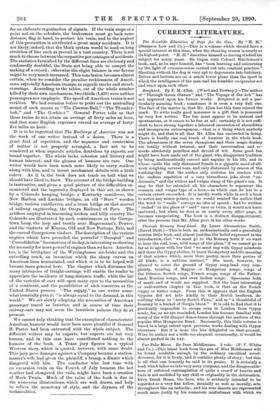Through Romany Song - Land. By Laura Alexandrine Smith. (David Stott.)—This is
both an enthusiastically and a gracefully written little book, and almost justifies the belief expressed in the introduction, that "we must go to the Romany tents if we want to hear the real, true, wild songs of the plain," if we cannot go so. far as to agree with her that "we must sup with Gypsy minstrels and share the Gypsy shelter, to learn the mystery and the meaning of that science which, more than poetry, more than genius of all kinds, is a sublime instinct." She must, however, be allowed to cover the ground of Gypsy song-land very com- pletely, treating of Magyar or Hungarian songs, songs of the Gitanos, Scotch songs, French songs, songs of the Father- land, Russian songs, and even Indian songs. Specimens both of music and of words are supplied. Not the least interesting or well-written chapter in this book, is that on the Scotch Gypsy or tinker songs. From this it appears that the English Gypsies did not take kindly to their Scotch brethren, de- scribing them as "nasty Scotch Faws," and as "a thimbleful of Romany to a bucket of Gorgio blood." It is odd to find that it is practically impossible to escape even in London from Gypsy music, for, as we are reminded, London has become familiar with many of the wild Zingari dance-tunes through the medium of the popular Blue Hungarian Band. Necessarily, this little volume is based to a large extent upon previous works dealing with Gypsy literature. But it is none the less delightful on that account. Were its author not a trifle too eloquent occasionally, it would be almost perfect in its way.


































 Previous page
Previous page